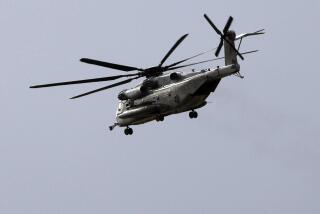Move to add Marines in Afghanistan
- Share via
MARINE HEADQUARTERS AT AL ASAD, IRAQ — Marine Corps leaders are devising a plan to send thousands of additional combat troops to Afghanistan to wage aggressive warfare against the Taliban that they expect could take years.
The Marines would like to deploy more than 15,000 troops if Defense Secretary Robert M. Gates and Army Gen. David H. Petraeus, newly named head of the U.S. Central Command, approve. About 2,300 Marines have already been sent to Afghanistan to replace units from Twentynine Palms, Calif., and Camp Lejeune, N.C., that are returning home after eight months.
Gates said Friday that he wanted to supplement the more than 30,000 American troops, mostly from the Army, already in Afghanistan. An additional 30,000 troops from other North Atlantic Treaty Organization countries and allies are also stationed in Afghanistan to combat the Taliban and other Islamist insurgent forces.
The office of President Hamid Karzai said Sunday that President-elect Barack Obama called Karzai during the weekend to say his administration would dedicate additional aid to fight militants in Afghanistan, the Associated Press reported.
The Marine proposal was sharpened during a series of meetings in Afghanistan, Iraq and Bahrain in the last week involving generals and other top officers. Marine Commandant Gen. James T. Conway was in contact with a group headed by Lt. Gen. Samuel Helland, commanding general of the Marine Force Central Command, traveling from base to base.
“Treat every day as a combat mission,” Helland wrote in a battle plan for one of his commanders. “Have a plan to kill the enemy hiding among the innocent.”
The Marines have long made no secret of their desire to depart from Iraq and redeploy to Afghanistan, where they were the first conventional U.S. troops in 2001 to invade the country to assist local forces in toppling the Taliban regime.
Finding troops will not be easy unless there is a significant drawdown in Iraq, where Marines have been deployed to Anbar province, west of Baghdad, since 2004. The Marines have about 22,000 troops in the sprawling province, assigned mostly to back up Iraqi security forces if the Sunni Arab insurgency attempts to rebound.
Maj. Gen. John Kelly, the top Marine in Iraq, who met with Helland last week, said there could be a “significant” reduction in Anbar within months without endangering progress made toward routing the insurgency and strengthening the Iraqi economy, political structure and security forces.
Kelly, in an interview, said his views were not prompted by the Marine Corps’ desire to redeploy to Afghanistan.
“All my recommendations and decisions have nothing to do with Afghanistan,” said Kelly, commander of the 1st Marine Expeditionary Force (Forward). “I’m absolutely focused on Iraq. I work 20-hour days. I don’t have time to read about Afghanistan.”
Marine leaders say the fight in Afghanistan will be different from the conflict in Iraq, where the Marines teamed with Sunni tribal sheiks to crush the insurgency and bring a measure of stability to the province.
In his orders to Col. Duffy White, commander of an air-ground task force deployed recently to Afghanistan, Helland warned that Afghanistan would be different because of its terrain, politics and culture and the presence of the coalition formed by NATO, the Afghan army and the U.S.
Iraq veterans should not be allowed to rest on the laurels of their success in Anbar, wrote the blunt-spoken Midwesterner and combat veteran of Vietnam. “Once a mistake is made, the excuse ‘This is how we did it in Iraq’ will not suffice,” Helland wrote.
Sending a large force into landlocked Afghanistan presents significant challenges for the Marine Corps, a sea service that operates best when it can be linked to a ship-based resupply system.
One plan being discussed by Marine brass would be to use Russian air cargo contractors flying aged aircraft. The U.S. already uses such contractors to bring mine-resistant armored vehicles into Iraq and Afghanistan.
If upper officers are keen on going to Afghanistan, so are many of the young Marines in Iraq. As Helland met with corporals and sergeants there, several offered to reenlist if they could be assured of going to Afghanistan, where they face a much higher probability of engaging in combat.
For the Marines, there is a sense of unfinished business in Afghanistan. In early December 2001, soon after the Taliban government was routed, Marines were part of a plan to attack the mountains of the Tora Bora region where Al Qaeda leader Osama bin Laden was believed to be.
But even as Marines waited at Kandahar airport to board helicopters, U.S. officials called off the attack, preferring that Afghan forces finish the task of capturing or killing Bin Laden and his top lieutenants. Instead, Bin Laden and many of the others escaped and are still at large.
Maj. Gen. Thomas Waldhauser, meeting with Marines of the 2nd Battalion, 7th Regiment, last week at the austere Forward Operating Base Delaram in Afghanistan, characterized the Marines as “starting over” in that country.
Waldhauser, commander of the Camp Pendleton-based 1st Marine Division, praised the Two-Seven, which has begun returning home, for its success in mentoring Afghan police, killing Taliban fighters and making contacts with tribal leaders.
“You guys have lived the dream,” he said.
--
More to Read
Sign up for Essential California
The most important California stories and recommendations in your inbox every morning.
You may occasionally receive promotional content from the Los Angeles Times.










